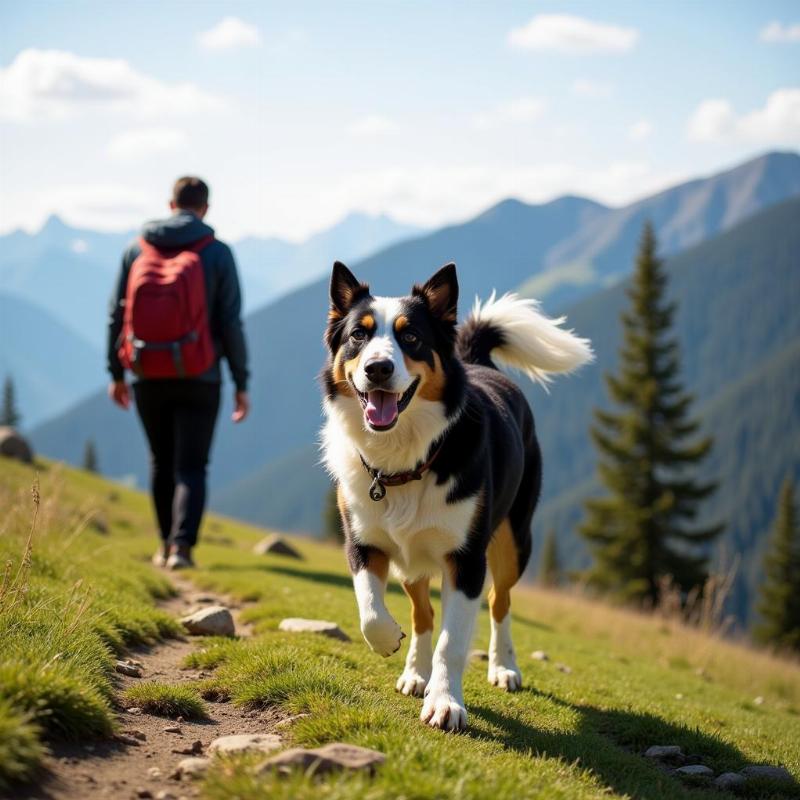The Greater Swiss Mountain Dog and Bernese Mountain Dog mix, often affectionately called the “Swissnese,” combines the best traits of two beloved giant breeds. If you’re considering adding this impressive crossbreed to your family, you’re in for a treat. This article will delve into everything you need to know about the Greater Swiss Mountain Dog and Bernese Mountain Dog mix, from their temperament and health considerations to training tips and grooming needs. This comprehensive guide will equip you with the knowledge to provide the best possible care for your Swissnese.
Are you ready to learn more about this magnificent mix? Let’s explore the world of the Greater Swiss Mountain Dog and Bernese Mountain Dog cross.
Temperament and Personality of a Swissnese
The Swissnese typically inherits the gentle and affectionate nature of both parent breeds. They are known for being loyal, playful, and good with children, making them excellent family companions. However, their large size means early socialization is crucial to ensure they grow into well-adjusted adults. Exposing them to various people, places, and sounds from a young age will help them develop confidence and prevent shyness or aggression.
While generally friendly, the Swissnese can be protective of their family and home, so proper training and socialization are essential. Their intelligence and eagerness to please make them relatively easy to train, but consistency and positive reinforcement are key.
Health Considerations for a Greater Swiss Mountain Dog and Bernese Mountain Dog Mix
Like all breeds, the Greater Swiss Mountain Dog and Bernese Mountain Dog mix can be prone to certain health issues. Both parent breeds are susceptible to hip and elbow dysplasia, so it’s important to choose a reputable breeder who screens their dogs for these conditions. Bloat, a life-threatening condition, is also a concern in large breeds, so feeding smaller meals throughout the day and avoiding strenuous exercise after eating can help minimize the risk. Regular veterinary checkups and a healthy diet are essential for maintaining the well-being of your Swissnese.
Other potential health concerns include certain cancers, eye problems, and von Willebrand’s disease, a bleeding disorder. Discussing these potential health issues with your veterinarian can help you develop a proactive plan for your dog’s care.
Grooming Your Swissnese: Tips and Tricks
Both the Greater Swiss Mountain Dog and the Bernese Mountain Dog have thick, double coats that require regular grooming. The Swissnese will likely inherit this trait, so be prepared for shedding. Brushing your Swissnese several times a week will help remove loose hair and prevent mats and tangles. Regular bathing is also necessary, but avoid over-bathing as it can strip their coat of its natural oils.
Exercise and Training Needs
Swissneses are energetic dogs that require regular exercise to stay happy and healthy. Daily walks, playtime in a fenced yard, and engaging activities like hiking or swimming are great ways to keep them physically and mentally stimulated. Their intelligence and eagerness to please make them receptive to training, so enrolling them in obedience classes or working with a professional trainer can be beneficial.
 Swissnese Hiking with Owner
Swissnese Hiking with Owner
Is a Swissnese Right for You?
A Greater Swiss Mountain Dog and Bernese Mountain Dog mix can be a wonderful addition to the right family. Their gentle nature, loyalty, and playful personality make them excellent companions. However, their large size, grooming needs, and potential health concerns require careful consideration. If you are prepared to provide the necessary care, training, and attention, a Swissnese can bring years of joy and companionship to your life.
FAQ
- How big does a Greater Swiss Mountain Dog and Bernese Mountain Dog mix get? A Swissnese typically weighs between 85 and 140 pounds and stands 23 to 28 inches tall at the shoulder.
- Are Swissneses good with children? Yes, they are generally good with children, but early socialization is essential.
- How much exercise does a Swissnese need? They require at least an hour of exercise per day.
- What is the lifespan of a Swissnese? Their lifespan is typically 8-12 years.
- Are Swissneses easy to train? They are intelligent and eager to please, making them relatively easy to train with positive reinforcement.
- Do Swissneses shed a lot? Yes, they have thick double coats and shed moderately throughout the year.
- What health problems are Swissneses prone to? They can be prone to hip and elbow dysplasia, bloat, certain cancers, and eye problems.
Related Articles
- greater swiss mountain dog mix
- dog breeds similar to st bernard
- greater swiss mountain dog bernese mountain dog mix
- race car bed for dogs
Beautdogs.us is your premier source for all things dog-related in the US. We offer expert advice on dog breeds, care, and products, catering to both new and experienced dog owners. From breed guides to grooming tips, Beautdogs.us is your trusted companion on your dog ownership journey. Contact us today to learn more! Email: [email protected], Phone: +1 501-555-7529.